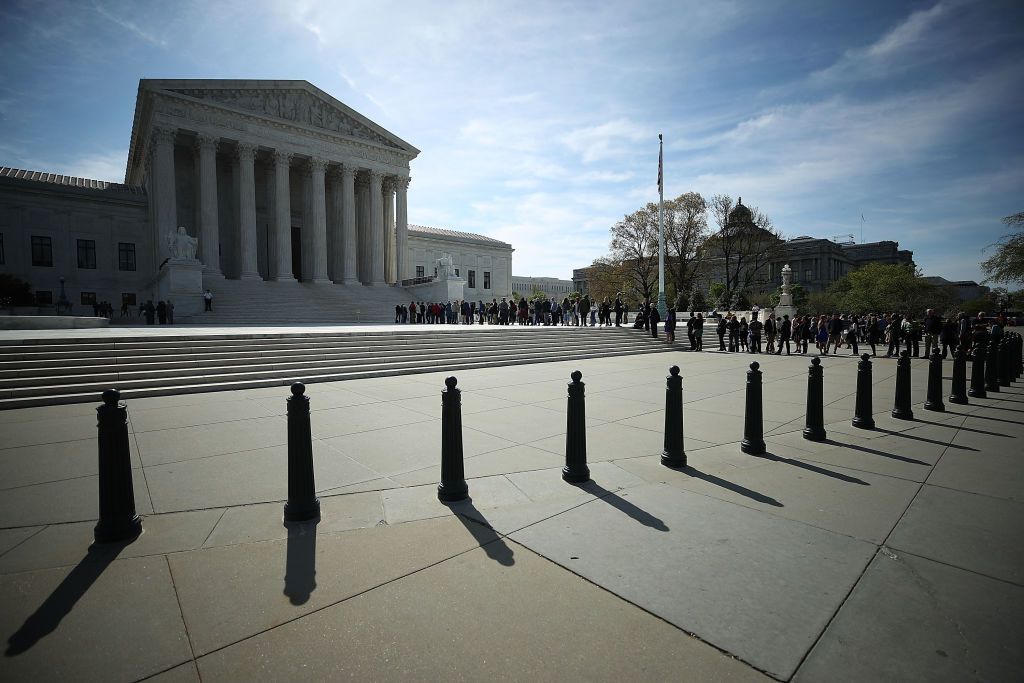The Supreme Court does not appear inclined to strike down Trump's travel ban


A free daily email with the biggest news stories of the day – and the best features from TheWeek.com
You are now subscribed
Your newsletter sign-up was successful
Based on questions raised by Supreme Court justices on Wednesday during the oral arguments in Trump v. Hawaii, which concerns President Trump's ban on travelers from six majority-Muslim countries, there does not appear to be an obvious five-judge majority to strike down the ban, The Washington Post reports. Lower courts have struck down three iterations of the ban to date, claiming it improperly overrides congressional lawmaking power, engages in "nationality discrimination," and does not demonstrate that "nationality alone renders entry of this broad class of individuals a heightened security risk or that current screening processes are inadequate."
As it stands now, the ban bars travelers from seven countries, although only the Muslim-majority ones are a part of the challenge: Syria, Libya, Iran, Yemen, and Somalia (Chad was originally included in the ban but was removed from the list earlier this month). Travelers from North Korea and Venezuela are also barred under the ban. Trump had specifically called for "a total and complete shutdown of Muslims entering the United States" when he introduced the idea in late 2015.
Conservative justices Samuel Alito and Neil Gorsuch pressed acting solicitor general Neal K. Katyal, who is representing Hawaii, on how exactly Trump has overstepped his legal grounds with the ban. Alito in particular noted that only 8 percent of the world's Muslim population would be affected by the ban, saying "a reasonable observer would not think this was a Muslim ban," The Washington Post reports. Read more about where the SCOTUS justices appear to stand on the debate here.
The Week
Escape your echo chamber. Get the facts behind the news, plus analysis from multiple perspectives.

Sign up for The Week's Free Newsletters
From our morning news briefing to a weekly Good News Newsletter, get the best of The Week delivered directly to your inbox.
From our morning news briefing to a weekly Good News Newsletter, get the best of The Week delivered directly to your inbox.
A free daily email with the biggest news stories of the day – and the best features from TheWeek.com
Jeva Lange was the executive editor at TheWeek.com. She formerly served as The Week's deputy editor and culture critic. She is also a contributor to Screen Slate, and her writing has appeared in The New York Daily News, The Awl, Vice, and Gothamist, among other publications. Jeva lives in New York City. Follow her on Twitter.
-
 6 of the world’s most accessible destinations
6 of the world’s most accessible destinationsThe Week Recommends Experience all of Berlin, Singapore and Sydney
-
 How the FCC’s ‘equal time’ rule works
How the FCC’s ‘equal time’ rule worksIn the Spotlight The law is at the heart of the Colbert-CBS conflict
-
 What is the endgame in the DHS shutdown?
What is the endgame in the DHS shutdown?Today’s Big Question Democrats want to rein in ICE’s immigration crackdown
-
 ‘One Battle After Another’ wins Critics Choice honors
‘One Battle After Another’ wins Critics Choice honorsSpeed Read Paul Thomas Anderson’s latest film, which stars Leonardo DiCaprio, won best picture at the 31st Critics Choice Awards
-
 Son arrested over killing of Rob and Michele Reiner
Son arrested over killing of Rob and Michele ReinerSpeed Read Nick, the 32-year-old son of Hollywood director Rob Reiner, has been booked for the murder of his parents
-
 Rob Reiner, wife dead in ‘apparent homicide’
Rob Reiner, wife dead in ‘apparent homicide’speed read The Reiners, found in their Los Angeles home, ‘had injuries consistent with being stabbed’
-
 Hungary’s Krasznahorkai wins Nobel for literature
Hungary’s Krasznahorkai wins Nobel for literatureSpeed Read László Krasznahorkai is the author of acclaimed novels like ‘The Melancholy of Resistance’ and ‘Satantango’
-
 Primatologist Jane Goodall dies at 91
Primatologist Jane Goodall dies at 91Speed Read She rose to fame following her groundbreaking field research with chimpanzees
-
 Florida erases rainbow crosswalk at Pulse nightclub
Florida erases rainbow crosswalk at Pulse nightclubSpeed Read The colorful crosswalk was outside the former LGBTQ nightclub where 49 people were killed in a 2016 shooting
-
 Trump says Smithsonian too focused on slavery's ills
Trump says Smithsonian too focused on slavery's illsSpeed Read The president would prefer the museum to highlight 'success,' 'brightness' and 'the future'
-
 Trump to host Kennedy Honors for Kiss, Stallone
Trump to host Kennedy Honors for Kiss, StalloneSpeed Read Actor Sylvester Stallone and the glam-rock band Kiss were among those named as this year's inductees
